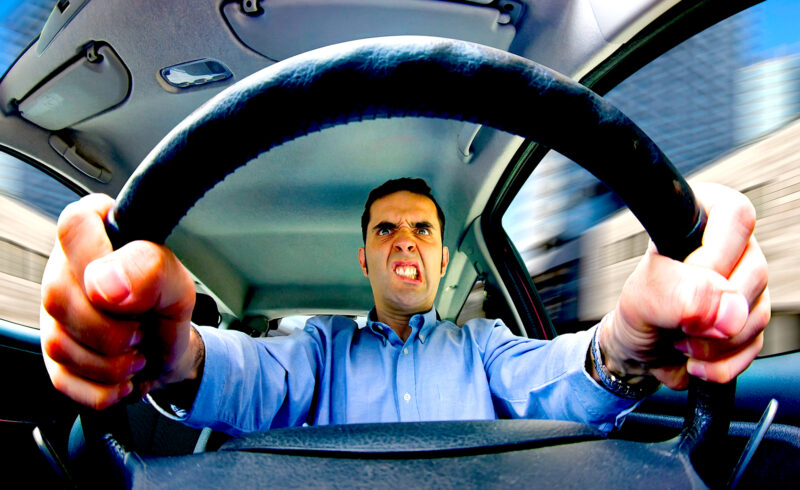
Nobody gets excited to drive in traffic. It makes most of us feel impatient even at the best of times. Some drivers may find themselves becoming aggravated in the event of less-than-ideal traffic conditions, and a small percentage of those allow their aggravation and impatience to mutate into something else entirely. Road rage is a growing concern amongst drivers across the country. With more and more people and cars beginning to fill roadways, many find themselves apprehensive when it comes to their chances of interacting with another driver exhibiting road rage.
Federal studies have indicated that crashes involving driver error also incorporate some element of road rage all too often.34 percent of all driver error-related accidents in one study occurred as a direct result of aggressive driving. If you or a loved one has been a victim of an incident involving road rage, one of your first steps should be to seek legal counsel. An experienced attorney can help you navigate the muddy waters that surround liability and other legal concerns when a crash goes from an accident to a crime.
What Is Road Rage?
Georgia law provides aclear definition of road rage. Anybody operating a motor vehicle with the intent to annoy, harass, injure, intimidate, or obstruct another person is engaging in road rage. These aggressive behaviors can be towards anybody—other drivers, pedestrians, passengers in other vehicles, and even passenger in the driver’s vehicle are all potential targets. One key component of a road rage incident in Georgia is the aggressive driver’s intent. Their problematic driving must be an intentional act directed towards a specific person or persons to consider it an instance of road rage.
How to Avoid Drivers With Road Rage
If you or a passenger in your vehicle believes that a nearby driver may be exhibiting signs of road rage, it’s important to try to decrease the likelihood of an accident occurring. Many drivers who become the victims of aggressive behavior respond with their own aggressive behavior of some kind. Avoid becoming angry or confrontational yourself—not only does it put you at increased risk, but it means that you could end up being the party that causes a crash.
Make an effort to give drivers who appear angry or distressed plenty of space on the road. Avoid excessive interaction or eye contact and try to avoid taking aggressive behavior personally. Remain focused and level while you operate any vehicle. In many cases, angry and aggressive drivers will fade into the surroundings if they aren’t fed with attention or egged on by retaliation.
Road Rage: Potential Injuries
Road rage is the source of many vehicle accidents that occur on today’s roads. If you find yourself in a crash that stemmed from another driver’s road rage, you could sustain injuries that significantly impact your quality of life. Drivers and passengers who sustain injuries in these types of accidents often find that their experience is exceptionally painful or traumatic—this is because one driver is almost always driving erratically and speeding. Some of the injuries that victims may experience in the event of a road rage accident include:
- Bruises and lacerations
- Broken bones
- Spinal cord trauma
- Organ damage or internal bleeding
- Head injuries
- Whiplash
Common Indications of Road Rage
The Department of Motor Vehicles defines road rage as a set of aggressive or violent behaviors that stem from a driver’s uncontrolled anger. It follows, then, that these signs could point to a driver experiencing road rage:
- Flashing headlights
- Brake checking
- Honking
- Speeding
- Cutting those around them off
- Tailgating
- Verbally abusing others (in the same vehicle or outside of it)
- Using rude gestures
- Weaving in and out of traffic
- Disregarding traffic signals, signs, and laws
Determining Liability
Determining liability in road rage cases has the potential to present some challenges. Many courts already struggle to utilize the evidence they’re provided and come to a decision when it comes to liability. Once road rage becomes a factor in this decision, it has the potential to transform a simple case of civil liability into a criminal prosecution.
Victims don’t need to file criminal charges or land a guilty verdict to file a suit against a driver who acted out of road rage. However, taking these steps could make proving liability easier. Those looking to recover damages in court also need to present sufficient evidence to prove the aggressive driver’s liability.
What Can Be Recovered in Court?
Victims of road rage accidents have the potential to recover compensatory damages in court. Depending on your experience during and after the crash, you may elect to seek certain damages and not others. The way that a victim and their legal representative choose to approach the idea of compensation and damages may impact the outcome of their case. Some of the compensatory damages often claimed in road rage cases include:
- Medical costs: Initial treatments, emergency treatments, ongoing treatments, and even future treatments.
- Lost wages: If a road rage accident causes a victim to miss work for recovery, court, doctor’s appointments, etc., they may be able to claim lost wages.
- Pain and suffering: A monetary figure may be assigned to account for physical, emotional, and mental pain victims suffer.
Were You in a Road Rage Incident?
If you or a loved one has been a victim of a road rage accident in Georgia, it’s wise to speak with an experienced personal injury attorney to learn more about your options. Road rage is more than just impolite or aggressive driving behavior: drivers engaged in road rage have the potential to cause severe, debilitating injuries or even death to motorists and pedestrians around them. By holding these drivers accountable for their actions, we can help keep Georgia roadways safe, and prevent innocent bystanders suffering harm due to another driver’s negligent or reckless conduct.
Schedule your free consultation by calling us at (404) 418-8244 orcontact us online.














